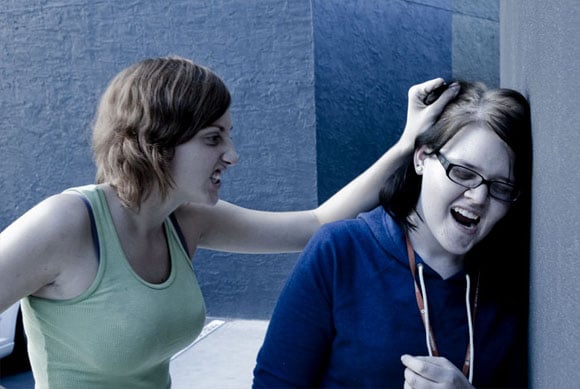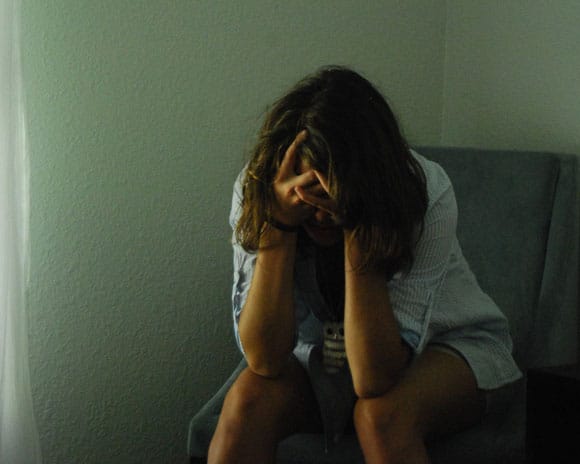“All too often women believe it is a sign of commitment, an expression of love, to endure unkindness or cruelty, to forgive and forget. In actuality, when we love rightly we know that the healthy, loving response to cruelty and abuse is putting ourselves out of harm's way.” — Bell Hooks, All About Love: New Visions
There are many types of abuse in relationships. Remember this: abuse and love are not compatible. If someone truly loves you, they will never repeatedly hurt you. Love does not masquerade as abuse. Abusers do not know how to love. You may love them, but that will not change them.
 Image source: beboehmer on Flickr
Image source: beboehmer on Flickr
Being hurt or damaged by a person that you love is always traumatic. No one deserves to be abused. It could be happening to you or someone you care about. If so, it's time to learn how to get out of an abusive relationship.
Unhealthy and abusive dynamics have a tendency to escalate. It gets worse over time. A person gets injured (physically and/or emotionally) in a relationship when their partner uses coercive behaviors and tactics on them. The abusive partner has developed these behaviors as a means to control and keep their partner hostage. Whatever form the abuse takes, it is about power.
Have you been in a physically or emotionally abusive relationship? Were you able to leave? Remember that you are not alone.
Although an abuser may be on their best behavior early on in a relationship, they have some common personality traits. One warning sign of a potential abuser is they require you to focus your attention 100 percent on them. They may use codependent terminology like. "I could not live without you," or even "I don't know what you would do without me."
Traits of An Abuser
 Image source: Phil Leftwich on Flickr
Image source: Phil Leftwich on Flickr
• Intense and emotional
• Codependent
• Speaks in terms of "all or nothing."
• Usually charming, popular, and gifted when young
• Over time abusers can become complainers
• Overly sensitive
• Does not take responsibility (it's someone else at fault)
• Moody (emotional ups and downs)
• May have been a victim of abuse in childhood
• Often compulsive nature (alcohol and drugs)
• Gets angry when not in control (Acts controlling)
Too Many Second Chances?
 Image source: slurpiestraws on Flickr
Image source: slurpiestraws on Flickr
Many times the abuser will claim they are sorry and beg for “another chance.” This is especially common in cases of physical abuse.
If you have been the victim of abuse, your self-esteem has been battered. You are confused by the behavior. You want to believe that your intimate partner loves you, and everything will be just fine. It's natural that you are trying to find anything to rationalize and understand what's happening to you.
The "apology" and "second chance" pattern seems to work for many abusers. First they apologize and say that they will never abuse you again. They claim that they can change. Then if you take them back, the cycle begins again.
If you are trying to leave an abusive partner, stop giving them the opportunity to do it again. Follow through on your decision to leave. Any person that abuses will most likely do it again given the opportunity.
It's Not Your Fault
 Image source: Mary Smith on Flickr
Image source: Mary Smith on Flickr
You are not alone! The National Coalition Against Domestic Violence reports that in the U.S., 20 people per minute are physically abused by an intimate partner in the United States. Annually, over 10 million women and men are affected.
One in three women and one in four men have been victims of physical violence by a partner.
Any abuse can cause long-term damage. Often, an abuser will use more than one type of abuse. Over time, the person being abused can become convinced that it is their fault. And that if they do what their abuser wants, then it will finally stop.
Get Support
 Image source: Marion Klein on Flickr
Image source: Marion Klein on Flickr
If you are in an unhealthy or abusive relationship, get support.
There are local resources where you live to help victims of abuse. In the US, you can call the National Domestic Violence Hotline 1-800-799-7233(SAFE).
If you are not sure that you are in an abusive relationship, get the facts. Just to be clear, if you are being hurt physically in your relationship, it is abusive. And you need to find a safe way out.
In cases of physical abuse, you need to report it to the police. Seek immediate medical attention. Make sure the abuse is documented. If you don't have medical records and police reports, at least take photographs of bruises, etc. If you are at the beginning of a relationship that is turning abusive, leave now.
It only gets more complicated and harder to leave down the road. If this is a marriage or otherwise a more involved relationship, you may need to make a plan and preparations to leave safely. Don't wait for it to get worse.
The Great Escape
 Image source: Chris Ford on Flickr
Image source: Chris Ford on Flickr
The first step to getting out of an abusive relationship is clarity. Once you understand that your significant other is behaving terribly, it is easier to let go. No more excuses or second chances.
Most empowering is the realization that you did not cause it, and you can't change someone else. You now understand that physical abuse is always the fault of the abuser. No one deserves any abuse.
There is always hope. You have to be willing to leave the abuser.
Once you have started to find support, things get better. In cases of physical or extreme abuse, you will need a support system.
Continue to talk to friends or family members that you know that you can trust. Work with your other support resources to create a safe exit plan. Getting out of the physical environment is important. You may need to move.
Reconnect with Life
 Image source: Miwok on Flickr
Image source: Miwok on Flickr
Reconnect with your loved ones. If you have been experiencing long-term abuse, you may have become isolated. When you leave the relationship, spend time reconnecting with family and other people you trust and enjoy. Often, the abuser will have tried to separate you from the people you care about. If this is the case, try to reconnect with those people.
The abusive ex may react to your leaving. It is best to minimize your contact with them as much as possible. Try to block their access to you on social media and phones. If you left the relationship after abuse, consider that you may even need to get a restraining order. Now that you are free of the abusive relationship, work on yourself. Spend some time recovering. Build your self-esteem. And most of all, be good to yourself.
The future holds many possibilities. Try a reading at Psychic Elements to help you find your way.

